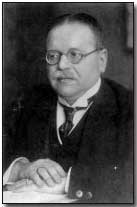Who's Who - Matthias Erzberger
 Matthias Erzberger (1875-1921)
was a moderate German politician who led calls for a negotiated peace in the
Reichstag in 1917 and served in the post-war cabinet as Minister of Finance.
Matthias Erzberger (1875-1921)
was a moderate German politician who led calls for a negotiated peace in the
Reichstag in 1917 and served in the post-war cabinet as Minister of Finance.
On the left of the Catholic Party Erzberger was elected to the Reichstag as a Deputy in 1903, a confirmed monarchist and patriot. This was not to say that he was not in favour of constitutional reform - so long as it was moderate and gradual.
Coming out in full support of the government in August 1914 Erzberger was given the challenging task of organising overseas German propaganda in 1914-15 (a sometimes seemingly impossible task). In the latter year Erzberger travelled to Italy as a member of the diplomatic mission intended to maintain Italy's neutrality - ultimately unsuccessful, as Italy entered the war on the side of the Allies on 23 May that year.
Over the course of the next year Erzberger's publicly stated war aims underwent a transformation. As late as 1915 he was calling for significant territorial annexations as the price of German peace (largely in France and Belgium). During the course of 1916 and early 1917 however he came to believe that a negotiated peace was not only desirable but necessary.
A firm opponent of unrestricted submarine warfare (along with many moderate Deputies in the Reichstag), Erzberger introduced the July 1917 Peace Resolution that led to the fall of Chancellor Bethman-Hollweg. Erzberger's publication of a secret memo authored by Austro-Hungarian Foreign Minister Ottokar Czernin, which was decidedly gloomy in its view of the conduct of the war, merely earned Erzberger the ultimately fatal enmity of right-wing groups without altering the course of the war.
Finally brought into Prince Max von Baden's government of October 1918, albeit without portfolio, Erzberger was a member of the German armistice delegation that finally agreed the armistice terms on 11 November 1918.
Remaining in the cabinet following the 1919 elections - as Minister of Finance - Erzberger worked hard to gain recognition of the widely reviled Treaty of Versailles. He was however obliged to resign in 1920 in the wake of financial allegations.
The following year, on 26 August 1921, Erzberger was murdered by a right-wing fanatic in Berlin.
Russia mobilised 12 million men during the war; France 8.4 million; Britain 8.9 million; Germany 11 million; Austria-Hungary 7.8 million; Italy 5.6 million; and the USA 4.3 million.
- Did you know?
